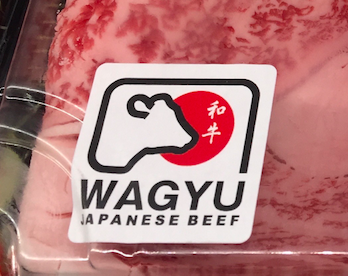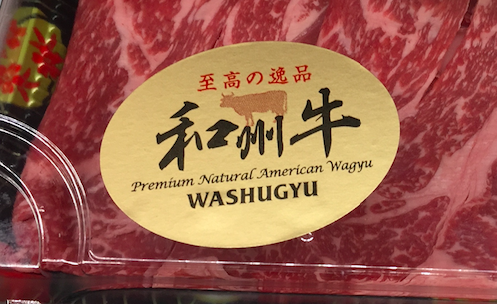Index
- Definition of wagyu
- How could you tell that beef is Japanese authentic wagyu?
- Definition of wagyu outside of Japan
Definition of wagyu
Definition of wagyu differs from country to country. In Japan, where wagyu originates, a cattle must be born and raised in Japan and must be one of the following breeds:
- Japanese Black (黒毛和種 “kuroge washu”)
- Japanese Brown (褐毛和種 “akage washu”)
- Japanese Shorthorn (日本短角和種 “nihon tankaku washu”)
- Japanese Polled (無角和種 “mukaku washu”)
- Mix of 1 to 4
- Mix of 1 to 5
More than 90% of wagyu produced in Japan is Japanese Black. Japanese Black beef is called 黒毛和牛 (“kuroge wagyu” meaning “black haired Japanese cattle”) in Japanese. The rarest breed is Japanese Polled. Only 51 Japanese Polled were processed to meat in 2016 in Japan (reference: National Livestock Breeding Center (in Japanese)).
How could you tell that beef is Japanese authentic wagyu?
All 和牛 (wagyu in Japanese) sold in Japan is Japanese authentic wagyu because it is illegal to sell as 和牛 (wagyu) if the cattle does not meet the above definition.
 Japanese authentic wagyu can be differentiated by a mark, established by Japan Livestock Industry Associaciton (JLIA) outside of Japan.
Japanese authentic wagyu can be differentiated by a mark, established by Japan Livestock Industry Associaciton (JLIA) outside of Japan.
In addition, all wagyu produced in Japan is traceable by 10-digit identification number, which enables you to search which breed it is, where the cattle was born and raised, the identification number of mother cow etc. at National Livestock Breeding Center (in Japanese), which database is open to public. Ask for the identification number if you doubt that it may not be Japanese authentic wagyu.
Definition of wagyu outside of Japan
Actually, before 2007, there was no rule that “a cattle must be born and raised in Japan” to be called as wagyu because the breeds mentioned above were native Japanese breeds and used to be raised only in Japan.
In 1980s and 1990s, wagyu DNAs of Japanese Black and Japanese Brown were brought into US and then to Australia. Cattle that has wagyu DNAs is raised now around the world. Most of wagyu you can find outside of Japan is non-Japanese wagyu, and the problem is that the definition of wagyu differs from Japan; therefore being called wagyu does not assure the quality equal to authentic Japanese wagyu.
Australia
To be registered as wagyu by Australian Wagyu Association, the cattle needs to have at least 50% genetic content from wagyu breeds. Even the wagyu named “purebred wagyu” is not 100% wagyu (more than 93%). 100% wagyu is called wagyu fullblood.
| Category | Genetic Content |
|---|---|
| Wagyu Fullblood | 100% |
| Purebred Wagyu F4 | greater than 93% |
| Crossbred Wagyu F3 | greater than 87% |
| Crossbred Wagyu F2 | greater than or equal to 75% |
| Crossbred Wagyu F1 | greater than or equal to 50% |
For more detailed information, visit Australian Wagyu Association.
United States
In US, “Kobe” is sometimes used as synonymous of wagyu, but this is common misuse of Kobe. Kobe is a region in Japan, and Kobe beef is a branded wagyu which has strict requirements to be named as Kobe, such as born and raised in Hyogo Prefecture (Kobe region).
 Washugyu (和州牛 (wa-shu-gyu) meaning, “Japanese-American cattle”) is sometimes said to be “American Style Kobe beef” but again, it is not Kobe beef because washugyu is a crossbred of Japanese Black and American Black Angus, raised in US. Washugyu tends to include less marbling than Japanese wagyu.
Washugyu (和州牛 (wa-shu-gyu) meaning, “Japanese-American cattle”) is sometimes said to be “American Style Kobe beef” but again, it is not Kobe beef because washugyu is a crossbred of Japanese Black and American Black Angus, raised in US. Washugyu tends to include less marbling than Japanese wagyu.
Learn more: Kobe beef
Genetic contents of registered wagyu in American Wagyu Herd Book could be as low as 37.5%. Which category the cattle is registered is determined by gender and genetic content.
| Category | Gender | Genetic Content |
|---|---|---|
| Fullblood Wagyu | All | 100% |
| Purebred Wagyu | All | greater than or equal to 93.75% (15/16) |
| Percentage Wagyu | Male | greater than or equal to 87.5% |
| Female | greater than or equal to 50% | |
| Recorded Wagyu | Male | greater than or equal to 50% |
| Female | greater than or equal to 37.5% |
For more detailed information, visit American Wagyu Association.
United Kingdom
UK’s wagyu association, Wagyu Breeders Association (WBA), was founded in 2014; it is quite new. UK followed Australian categories. WBA is seeking to protect the British wagyu brand by the mark. To be eligible to put the mark on, a cattle must be sired by a registered fullblood wagyu bull, which means that at least 50% of its genetic content is Japanese breed.